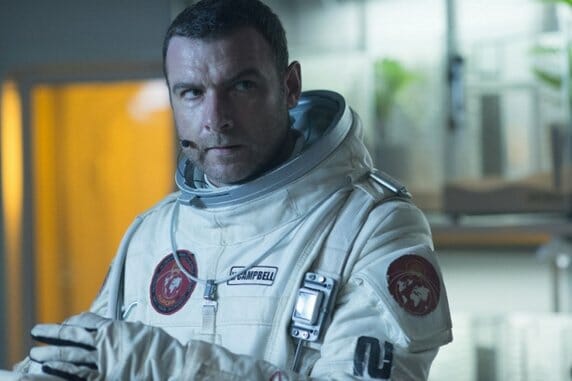
An unimaginative retread of recent science-fiction items like Sunshine and Prometheus (films that themselves are no beacons of originality), The Last Days on Mars is a movie whose greatest virtues (visual flair, production-value economy) are marred by a dull storyline that is unworthy of feature-length treatment. Screenwriter Clive Dawson, working from Sydney J. Bounds’s 1975 short story “The Animators,” fails to enliven the film’s genre-staple premise—a team of astronauts discovers something mysterious, dangerous, and seemingly beyond comprehension—with enough character detail or sci-fi creativity to sustain our attention. As a feature-length debut for director Ruairi Robinson, the movie’s not a bad clip reel, but that’s nowhere near enough to overcome the film’s fundamental narrative shortcomings.
Set about 20 years into the future, the film begins on the Tantalus Base on Mars, where a team of astronauts is 20 hours away from closing up their six-month mission. While most of the crew members are happy to be heading back to Earth (to drive this point home, the song “Blue Skies Are Around the Corner” is heard on multiple occasions), geologist Kim (Olivia Williams), the sourpuss of the group, is decidedly displeased, as the mission has failed to yield any significant scientific progress. Little does she realize that Marko (In the Land of Blood and Honey’s Goran Kostic), unbeknownst to the rest of the team, has been conducting secret research on the side. Just as the mission is about to conclude, Marko’s risky last-minute search to find evidence of life on the planet serves as the film’s inciting incident.
For no discernible reason whatsoever, Liev Schreiber’s Vincent Campbell is the film’s main character. As a portrait of psychological anxiety, which is what appears to be the intention with the Schreiber character, The Last Days on Mars is fatally unconvincing; the trauma-inducing flashbacks bestowed upon Vincent are vague and incoherent to the point of frustration, rendering his claustrophobic panic attacks—an easily relatable condition, considering the circumstances—utterly meaningless. Schreiber’s generally relaxed performance only makes this aspect of the character more confusing: that the actor (save for a nice monologue at the end of the movie) is sleepwalking through the role would honestly be fine in most straight-man scenarios, but it’s at odds here with a character who is apparently meant to be psychologically vulnerable.
Not that the other members of the film’s distinguished international cast—Elias Koteas, Romola Garai, Johnny Harris, Tom Cullen (one of the co-stars of Andrew Haigh’s Weekend), up-and-comer Yusra Warsama—necessarily fare any better, as Dawson’s script differentiates the various personalities with little more than basic, uninteresting traits. Were the genre conceptions more exciting, this would be less of a problem, but Dawson’s handling of the sci-fi hook—that Marko’s prized bacteria actually turns the astronauts, one-by-one, into drill-gun-wielding zombies—isn’t pitched with much energy or enthusiasm, or even an overarching mythology that might add some intrigue to the proceedings. Additionally, the fact that the movie’s predators aren’t external villains (but, rather, members of the crew turned into homicidal creatures) negates the potential for simple good-guy/bad-guy entertainment value; it’s hard to even root against the zombies, because they’re people we knew just a couple minutes ago.
What keeps The Last Days on Mars from completely imploding is the accomplished craft. The composer is no less a talent than Max Richter, whose “On the Nature of Daylight” provided Martin Scorsese’s Shutter Island with its haunting central melody. (Richter’s other screen credits include Waltz with Bashir, Lore, Wadjda, and The Congress.) The Mars landscapes—captured in real life in the deserts of Jordan—are handsomely treated by cinematographer Robbie Ryan, who seems in the midst of a breakthrough (he shot Philomena, for instance) after years of hard, strong work for director Andrea Arnold (Red Road, Fish Tank, Wuthering Heights). Production designer Jon Henson, meanwhile, helps lay the groundwork for a sci-fi film that, on a relatively meager budget, has no problems persuading us of its surface authenticity.
In this sense, the film is above all a promising maiden look at the Ireland-born Robinson’s ability to control atmosphere. Best known to date for his short films (Blinky™, the Oscar-nominated Fifty Percent Grey), Robinson is at his finest in the film’s opening passages, during which he finds compelling ways to contrast the exterior surface of Mars (mammoth dust storms, empty vistas) with the interior of the crew’s base (rigid doors, hallways, panes of glass). As the film moves along, he gets to interweave certain plot-derived happenings into these base compositions; one highlight is an instance of zero-gravity blood that, for a majority of viewers, will recall Sandra Bullock’s Gravity tear. But these minor flashes of ingenuity are unable to overcome the persistent absence of narrative interest or psychological coherence.
Director: Ruairi Robinson
Writer: Clive Dawson
Starring: Romola Garai, Elias Koteas, Liev Schreiber, Olivia Williams
Release Date: Dec. 6, 2013